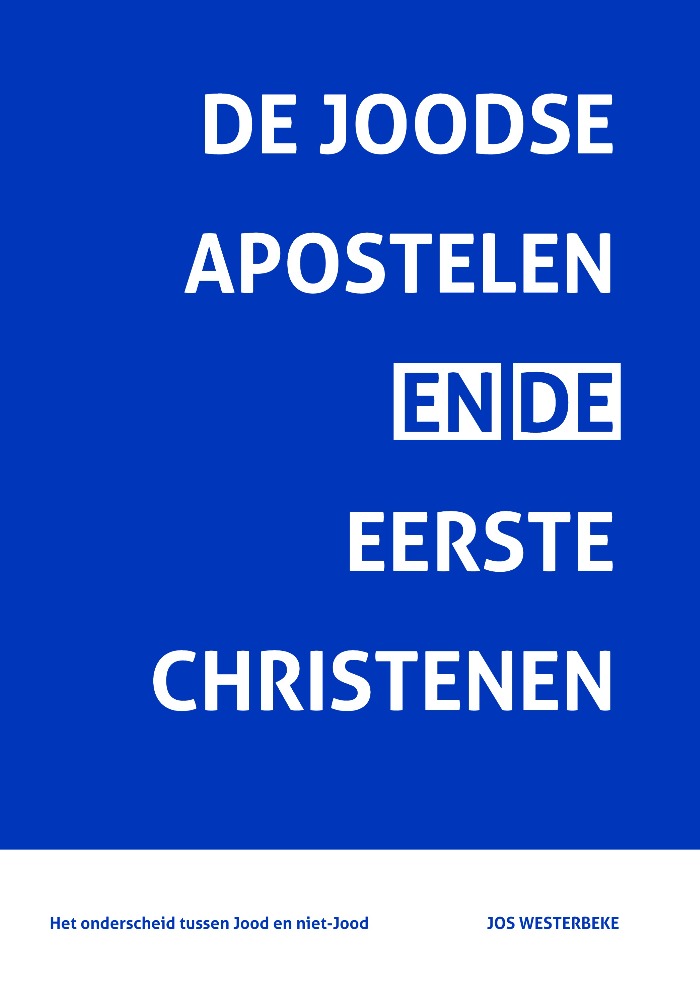I’ve not been here for a while, but now a can present you a new book from my hand: De Joodse Apostelen en de eerste Christenen: Het onderscheid tussen Jood en niet-Jood.
It’s written in Dutch, but I included a chapter with an abstract in English. Here’s the abstract:
“The first part of this book comprises the establishment of Christianity from its Jewish cradle. The first Jewish ‘Christians’ (Christianity didn’t exist then) are examined related to contemporary Jews and non-Jewish (gentile) Christians. And how their Christian communities evolved among the established Jewish communities.
The second part shows that the apostles Paul, Peter, James and John kept living a Jewish life, according to the law. Not always is this as obvious in the New Testament scripture, but the other way around, scripture does not give any reason to think that the Torah law is abolished for the Apostles and all Jews. Gentile believers however ought not to obey the Torah as Jews do. Examining the apostle Paul gives clear evidence of Paul being a Jew obeying Jewish law and hence keeping his Jewish identity until the end of his life. The apostles James and Peter appear to live Jewish in the New Testament too. The apostle John is least clearly pictured in the New Testament about living according to the Torah, yet it arguably gives far enough reasonable confidence to believe this and it is very hard to reject.
During the development of the first Christian communities, a parting from Judaism occurred. This parting of the ways is difficult to understand because history tends to picture this as a parting of Judaism and Christianity. This book argues that the parting occurred within the new community of followers of the Apostles, between Jewish Christians and Gentile Christians. The parting between Jewish Christians and Gentile Christians actually happened in the first and second century. And the Jewish Christians afterwards disappeared, at least after more than three centuries. In the second century the communities with a majority of gentile Christians took advantage of the situation and shaped their own religion: Christianity.
Christianity (so to speak) in its beginning in the time of Jesus and the apostles, until the year 70, is not a religion apart from Judaism. There was no such thing as ‘Christendom’. Christianity became a religion in the second century, apart from Judaism.
Meanwhile, in the time of the apostles, gentiles got a place within the Jewish religion and community, as there was always a place for non-Jewish righteous gentiles within Israel. This is made clear at the apostle convent in the 15th chapter of the book of Acts.
The church however, historically did not deal with the differences between Jews and Gentiles within Christian community. Jewish identity was gradually moved outside of the community. From the second century on, the church stressed the differences between Christian identity and Jewish identity. Jewish and Christian identity developed in contradiction. The result was and still is that Jewish Christians (and thus the apostles too) could not incorporate into either Christian or Jewish religion. This is an indictment for both religions.
The finding of the book is that there must remain a difference between Jewish believers and gentile believers. One religion can cover both. Christianity and Judaism essentially belong to each other. Moreover Judaism is the religion of the apostles. The difference between Jews and Gentiles was (and perhaps still is) an intra related matter within Judaism. Given the apostles being Jews within Judaism, then it could be argued that the gentile believers could fit in Judaism as well.”
You can buy this book here.
More about it on my Dutch blog.
Tags: Early Christianity, Jewish Christians, Joodse Apostelen


Leave a comment